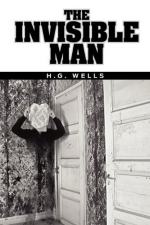“To do such a thing would be to transcend magic. And I beheld, unclouded by doubt, a magnificent vision of all that invisibility might mean to a man—the mystery, the power, the freedom. Drawbacks I saw none. You have only to think! And I, a shabby, poverty-struck, hemmed-in demonstrator, teaching fools in a provincial college, might suddenly become—this. I ask you, Kemp if you ... Anyone, I tell you, would have flung himself upon that research. And I worked three years, and every mountain of difficulty I toiled over showed another from its summit. The infinite details! And the exasperation! A professor, a provincial professor, always prying. ’When are you going to publish this work of yours?’ was his everlasting question. And the students, the cramped means! Three years I had of it—
“And after three years of secrecy and exasperation, I found that to complete it was impossible—impossible.”
“How?” asked Kemp.
“Money,” said the Invisible Man, and went again to stare out of the window.
He turned around abruptly. “I robbed the old man—robbed my father.
“The money was not his, and he shot himself.”
CHAPTER XX
AT THE HOUSE IN GREAT PORTLAND STREET
For a moment Kemp sat in silence, staring at the back of the headless figure at the window. Then he started, struck by a thought, rose, took the Invisible Man’s arm, and turned him away from the outlook.
“You are tired,” he said, “and while I sit, you walk about. Have my chair.”
He placed himself between Griffin and the nearest window.
For a space Griffin sat silent, and then he resumed abruptly:
“I had left the Chesilstowe cottage already,” he said, “when that happened. It was last December. I had taken a room in London, a large unfurnished room in a big ill-managed lodging-house in a slum near Great Portland Street. The room was soon full of the appliances I had bought with his money; the work was going on steadily, successfully, drawing near an end. I was like a man emerging from a thicket, and suddenly coming on some unmeaning tragedy. I went to bury him. My mind was still on this research, and I did not lift a finger to save his character. I remember the funeral, the cheap hearse, the scant ceremony, the windy frost-bitten hillside, and the old college friend of his who read the service over him—a shabby, black, bent old man with a snivelling cold.
“I remember walking back to the empty house, through the place that had once been a village and was now patched and tinkered by the jerry builders into the ugly likeness of a town. Every way the roads ran out at last into the desecrated fields and ended in rubble heaps and rank wet weeds. I remember myself as a gaunt black figure, going along the slippery, shiny pavement, and the strange sense of detachment I felt from the squalid respectability, the sordid commercialism of the place.




